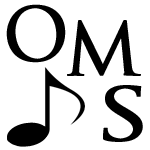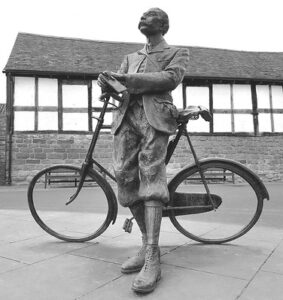OMS are working hard on the programme for our spring concert at 7.30pm on Saturday 25 March 2023 at St Johns Church, Burscough, L40 4AE. Tickets are £12 for adults, £5 (student/U18) and £25 for a family of 2 adults and up to 4 children. They are on sale now by phone (07906 129393), from society members or online.

There will also be tickets available on the door.
But that’s all the admin. What are we actually planning to play?
In this series of blog posts we wanted to introduce our programme and dig a little deeper into how some of the pieces came about.
Elgar’s Enigma Variations
This piece requires no introduction, right? It starts off a bit sad and ends with Nimrod, right? You wipe away tears and struggle to get that stiff upper lip back under control before the house lights come back on, no? Well, there’s more too it than that.
First of all, the title is officially Variations on an Original Theme but we’re happy to use Engima Variations, partly because that’s what people recognise and there is no such thing as overusing the word enigma.
What’s the original theme and how does it get varied? Well Elgar wrote this to his friend, August Jaeger:
The Variations have amused me because I’ve labelled ’em with the nicknames of my particular friends—you [Jaeger] are Nimrod. That is to say I’ve written the variations each one to represent the mood of the ‘party’…it’s a quaint idee & the result is amusing to those behind the scenes & won’t affect the hearer who ‘nose nuffin.’
The main theme is the ‘enigma’. It is a dark, questioning melody but the light also gets in. This is just the start of it.
As a player who ‘nose nuffin’, I found this whole piece really intriguing. I had some vague idea that each movement was about someone or something but really in my heart, I was just saying, ‘When do the violins get to play Nimrod?’ Not so fast!
Elgar, who was in his early forties when he completed the piece in 1899, had a wide circle of friends, many of them musicians. The work is dedicated to ‘my friends pictured within’. Each of the 14 variations is headed up with initials, characters or a single name indicating who they represent, more or less cryptically, depending on the situation. Elgar picks up something about their personality in the music: always rushing, their laugh etc. It is kindly done and meaning is piled upon meaning the closer you go into the details of individuals and their relationship to the composer.
No article about the Enigma Variations would be complete without a list. So, with thanks to the Encylopaedia Britannica, here we go:
-
C.A.E. (Elgar’s wife, Caroline Alice Elgar)
-
H.D.S.-P. (Hew David Steuart-Powell, a pianist and fellow chamber musician)
-
R.B.T. (Richard Baxter Townshend)
-
W.M.B. (William Meath Baker)
-
R.P.A. (Richard Penrose Arnold, son of English poet Matthew Arnold)
-
Ysobel (Isabel Fitton, an amateur viola player)
-
Troyte (A. Troyte Griffith, an architect and would-be pianist)
-
W.N. (Winifred Norbury, a matron of the arts with a distinctive laugh)
-
Nimrod (A.J. Jaeger)
-
Dorabella (Dora Penny, daughter of the rector of Wolverhampton)
-
G.R.S. (George Robertson Sinclair, organist at Hereford Cathedral, and his dog)
-
B.G.N. (Basil G. Nevinson, amateur cellist and fellow chamber musician)
-
*** (a female friend thought to be traveling)
-
E.D.U. (Elgar’s wife’s nickname for him)
*** indicates the initials of an unidentified female who was, at some point, on a long journey at sea. Delicacy seems to have prevented any further identification with a local musical patron or maybe a long lost ex.
The finale builds to a rousing climax incorporating a theme that now feels like an old friend. Nimrod itself is right in the middle, surrounded by contrasting movements.
Oh, and who is Nimrod again? Well, Nimrod is ‘a mighty hunter before the Lord’ in the Hebrew Bible (Genesis 10:8-12). The movement is dedicated to August Jaeger, a music editor at Novello & Co and close friend of the composer. Jaeger is German for hunter, so there you go. Elgar the crossword setter, perhaps? Jaeger encouraged Elgar to keep composing through difficult times so what better tribute could he pay than dedicating to him one of the most impressive, moving and well-known pieces of music ever written. Thanks mate.
Next time, we’ll take a deeper dive into the poetry of Robert Frost and how that came to be adapted into Randall Thompson’s Frostiana.

